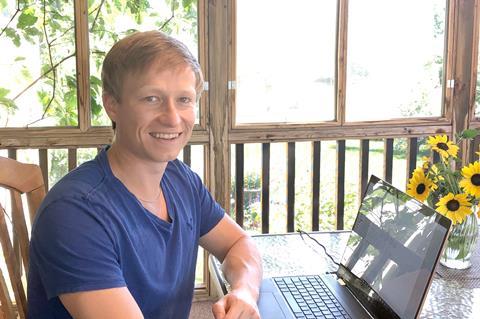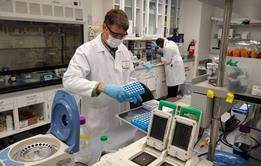Fuzionaire’s cofounder and chief scientist reflects on how Covid-19 has affected his growing company

During this difficult time, Chemistry World is checking in with notable chemists around the globe to see how they are weathering the coronavirus pandemic.
Anton Toutov, cofounder and chief science officer of Fuzionaire – which is developing new technologies based on discoveries in fundamental chemistry that he helped make as a doctoral candidate in Nobel Prize winner Robert Grubbs’ lab at the California Institute of Technology – says his company did experience some disruptions due to the pandemic early on. This was largely because its partners are academic institutions that had to close down for a period to prevent the spread of Covid-19.
Nevertheless, Fuzionaire – based in Pasadena, California – was in a good position when the pandemic hit because it was designed from its 2016 inception to organise research at various labs remotely. ‘We have always needed to communicate remotely with our various partners across the US and in different countries, and as a result there didn’t need to be large changes in how we do things because of the pandemic,’ Toutov explains. This coordination with external collaborators is done predominantly through online videoconferencing platforms like Zoom, as well as email.
Even when the company’s research wasn’t ongoing at its partner institutions during the height of the pandemic, Toutov says the company never really slowed down. ‘We always had discussions with our collaborators and partners about interpretation of data, and what to do next,’ he recounts. That quieter time gave the company’s leadership an opportunity to reflect and take stock, Toutov says.
Fuzionaire has an ongoing partnership with Virginia Commonwealth University (VCU) in Richmond, Virginia, US, and it has a major collaboration with McGill University in Montreal, Canada to support its radiopharmaceutical subsidiary, Fuzionaire Diagnostics.
Beyond North America to Japan and Switzerland
Because Fuzionaire doesn’t yet have a lab of its own, its research takes place in the labs of these partner institutions, which both essentially shut down for a few months in mid-March. ‘Basically, it was essentially a full stop for a certain period of time to keep everybody safe, but things have recently come back online,’ Toutov says.
Beyond North America, Fuzionaire Diagnostics launched a Tokyo-based Japanese affiliate in October 2019, and in December it announced collaborative research with Osaka University medical school’s nuclear medicine and tracer kinetics department to accelerate the discovery of novel anti-cancer radiotherapeutic agents.
Osaka University’s first confirmed case of Covid-19 was at the end of March, and around then the school implemented significant restrictions. The university’s research and labs returned to normal operations on 17 July, albeit with limited time spent in research labs.
‘In Tokyo, there were a few hotpots, and Osaka did shut down for a while, or have greatly diminished capabilities and research, but they have of course since bounced back,’ Toutov recalls. The Osaka partnership is still not fully online, he notes. ‘The moment you start getting involved with a centre that’s working closely with hospitals there might be additional issues there in light of the pandemic,’ Toutov adds. ‘It looks like things are at least on course and looking better.’
In July, Fuzionaire also unveiled another partnership with ETH Zurich in Switzerland, to advance some of its fuels chemistry work. That collaboration, which aims to develop Fuzionaire’s patented method to reduce sulfur content in diesel fuel, was also affected by the pandemic but Toutov says it is ‘more or less online’ now.
Former competitors unite
Aside from his Fuzionaire work, Toutov is an assistant professor at VCU. He is not onsite at the university and does not have teaching obligations there. But, he has been involved with VCU’s research programmes for some time, and the arrangement allows him extra flexibility to work with students. For example, Toutov recently served as an external reviewer on a PhD candidate’s thesis, participating in the dissertation committee meeting that was entirely virtual.
‘It was quite a thing, certainly a sign of the times,’ he says. The event recently took place over Zoom, with all of the reviewers watching online as the student delivered his presentation over a laptop. ‘He had a number of his colleagues there supporting him on Zoom, and of course they had to go away for the review to actually occur,’ Toutov recounts.
Toutov, who lives in Pasadena, has ridden out the pandemic with his parents in their Kingston, Ontario home since the end of March, teleworking. The three are very close and like to cook together, work in the garden, and go for walks. ‘We’ll talk about stuff, it can be science or non-science – Mom and Dad are both mathematicians, so sometimes we geek out together,’ Toutov says.
If there was any positive to come out of the pandemic aside from more family bonding, he believes it is the impressive global mobilisation of drug discovery and therapeutics to fight Covid-19. ‘Former competitors and others coming together against a common enemy, working towards a common goal, it is a remarkable thing to behold,’ Toutov states.
He hopes that people will remember not just the pain and suffering that arose from Covid-19, but also the collaboration between scientists from different disciplines and sectors to try to solve a once in a century catastrophe.
Chemists amid coronavirus

How chemists around the world are coping with life and work during the Covid-19 pandemic
- 1
- 2
- 3
- 4
- 5
- 6
- 7
- 8
- 9
- 10
- 11
- 12
- 13
- 14
- 15
- 16
- 17
- 18
- 19
- 20
- 21
- 22
- 23
- 24
- 25
- 26
- 27
- 28
- 29
- 30
- 31
- 32
- 33
- 34
 Currently
reading
Currently
reading
Chemists amid coronavirus: Anton Toutov
- 36
- 37
- 38
- 39
- 40



























































































No comments yet